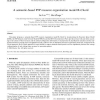Free Online Productivity Tools
i2Speak
i2Symbol
i2OCR
iTex2Img
iWeb2Print
iWeb2Shot
i2Type
iPdf2Split
iPdf2Merge
i2Bopomofo
i2Arabic
i2Style
i2Image
i2PDF
iLatex2Rtf
Sci2ools
JSS
2006
2006
A semantic-based P2P resource organization model R-Chord
This paper proposes a semantic-based P2P resource organization model R-Chord by incorporating the Resource Space Model (RSM), the P2P Semantic Link Network Model (P2PSLN) and the DHT Chord protocol. Peers provide services with each other according to the content of their resources and the related configuration information. It incorporates the classification semantics and the relational semantics to provide users and applications with a uniform view on distributed resources. Experiments show that, compared to the Chord approach, the R-Chord approach is more flexible to support semantic-based queries and can significantly decrease the average visiting number of and visiting times on peers for answering queries.
| Added | 13 Dec 2010 |
| Updated | 13 Dec 2010 |
| Type | Journal |
| Year | 2006 |
| Where | JSS |
| Authors | Jie Liu, Hai Zhuge |
Comments (0)

